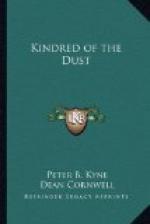XLVI
Spring came. Overhead the wild geese flew in long wedges, honking, into the North, and The Laird remembered how Donald, as a boy, used to shoot at them with a rifle as they passed over The Dreamerie. Their honking wakened echoes in his heart. With the winter’s supply of logs now gone, logging operations commenced in the woods with renewed vigor, the river teemed with rafts, the shouts of the rivermen echoing from bank to bank. Both Tyee and Darrow were getting out spruce for the government and ship timbers for the wooden shipyards along San Francisco Bay.
Business had never been so brisk, and with the addition of the war duties that came to every community leader, The Laird found some surcease from his heart-hunger. Mrs. McKaye and the girls had returned to The Dreamerie, now that Donald’s marriage had ceased to interest anybody but themselves, so old Hector was not so lonely. But—the flag was flying again at the Sawdust Pile, each day of toil for The Laird was never complete without an eager search of the casualty lists published in the Seattle papers.
Spring lengthened into summer. The Marine casualties at Belleau Wood and Chateau-Thierry appalled The Laird; he read that twenty survivors of a charge that started two hundred and fifty strong across the wheat field at Bouresches had taken Bouresches and held it against three hundred of the enemy—led by Sergeant Daniel J. O’Leary, of Port Agnew, Washington! Good old Dirty Dan! At last he was finding a legitimate outlet for his talents! He would get the Distinguished Service Cross for that! The Laird wondered what Donald would receive. It would be terrible should Dirty Dan return with the Cross and Donald McKaye without it.
In September, Donald appeared in the Casualty List as slightly wounded. Also, he was a first lieutenant now. The Laird breathed easier, for his son would be out of it for a few months, no doubt. It was a severe punishment, however, not to be able to discuss his gallant son with anybody. At home his dignity and a firm adherence to his previous announcement that his son’s name should never be mentioned in his presence, forbade a discussion with Mrs. McKaye and the girls; and when he weakly sparred for an opportunity with Andrew Daney, that stupid creature declined to rise to the bait, or even admit that he knew of Donald’s commission. When told of it, he expressed neither surprise nor approval.
In November, the great influenza epidemic came to Port Agnew and took heavy toll. It brought to The Laird a newer, a more formidable depression. What if Donald’s son should catch it and die, and Donald be deprived of the sight of his first-born? What if Nan should succumb to an attack of it while her husband was in France? In that event would Donald forgive and forget and come home to The Dreamerie? Somehow, old Hector had his doubts.




